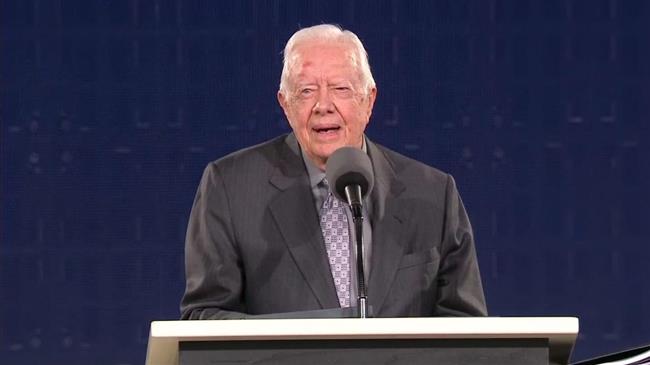
RNA - "We should be the champion of human rights. We're a superpower, not based solely on military power; part of that definition should be a commitment to human rights," Carter said Tuesday at an event at The Carter Center in Atlanta, Georgia.
"We have lost the long-term commitment to human rights," he said.
“We should be a superpower because we espouse things that are important to everyone on earth and I think human rights are one of them,” he added.
Carter, 93, served as the 39th US president from 1977 to 1981.
The former Democratic president has been particularly critical of the nation's direction under Trump’s leadership.
Tuesday's event, part of an annual forum discussing human rights, brought together more than 60 "activists, peacemakers and community leaders," according to a news release.
Carter specifically addressed immigration law, and said immigrants should have a "clear picture" of what happens after crossing into the United States.
"We need a comprehensive bill that has bipartisan support. Immigrants need to have a clear picture of what will happen to them when they come here. Clarification of US law is most important," he said.
Notably, observers say the US has never been a leader of human rights, criticizing its domestic, social and economic issues, such as poverty, crime, racism and gun violence, as well as America's support for regimes like Saudi Arabia and Israel, which are among the biggest violators of human rights.
According to Press TV, the comments from Carter come as Trump and his administration continue to face widespread criticism for separating thousands of undocumented families illegally crossing the US-Mexico border.
In February, human rights advocacy organization Amnesty International accused Trump of violating human rights by adopting “hateful” politics.
"President Trump takes actions that violate human rights at home and abroad," the UK-based group said in its annual report titled The State of the World’s Human Rights.
Experts from the United Nations have also warned that African Americans in the US face a "human rights crisis" and they should receive reparations for slavery.
Critics say the United States turns a blind eye to its own terrible human rights situation and say Washington uses the human rights issue as "a political instrument to defame other nations' image and seek its own strategic interests."
847/940